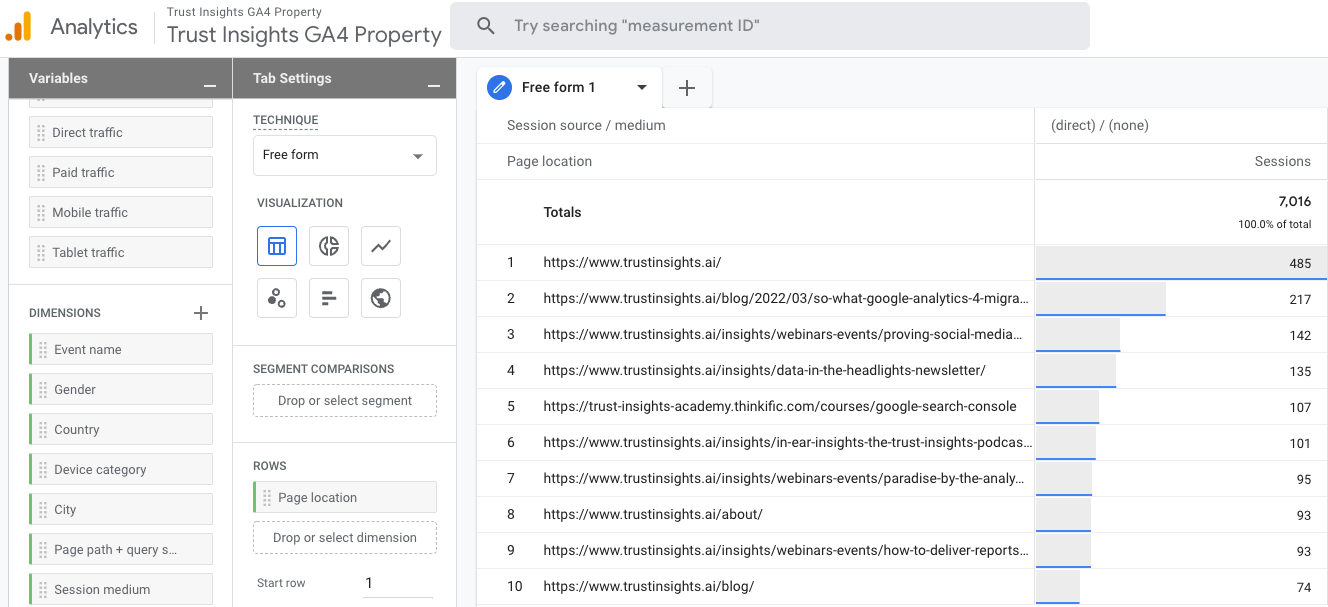This data was originally featured in the June 1st, 2022 newsletter found here: https://www.trustinsights.ai/blog/2022/06/inbox-insights-june-1-2022-google-analytics-4-course-metrics-going-the-wrong-way-analytics-as-a-mirror/
In this week’s Data Diaries, let’s look at an example of putting analytics data into action. One of the challenges of analytics is that it’s inherently rearward-looking; analytics data is like looking in the rear-view mirror of a car while driving. Looking in the rear-view mirror is a practical and sensible thing to do; driving the car entirely by doing only that is not. What are the issues with using analytics as a mirror?
So how do we make use of analytics data in a way that lets us keep our eyes on the road ahead? We use it to determine where we’ve been that we might not want to have gone, or where we might want to go again. Here’s an example, using Google Analytics data. Direct traffic is traffic that has no attributable source to it; Google is unsure where it came from and thus assigns it that designation.
If direct traffic has no attribution, then what good is it? How does it help us? One of the things we could do in Google Analytics 4’s Explore Hub is construct an exploration looking at where direct traffic goes on our website:

What we see in Explore Hub is that our homepage gets the lion’s share of direct traffic, along with a few other pages.
So what? Here’s the thing about the pages above, particularly lines 3, 5, 7, and 9. Those are landing pages, pages with conversion opportunities on them. The fact that they’re getting traffic without attribution data is problematic because it means we’re driving traffic to those landing pages but we have no idea where that traffic is coming from.
Is it coming from an email without UTM codes on its links? Is it coming from social media? Is it coming from users who have strict privacy settings turned on? Or worse, could it be coming from an ad campaign where we’re spending money but we don’t have any idea how that ad is performing because there’s a misconfiguration in our tracking? If that’s the case, we need to know as soon as possible so we can fix our advertising and not waste money to generate results blindly – or not generate results at all.
This is where analytics shines. When you’ve made a wrong turn, the easiest way to figure out what to do is to check the rearview mirror, turn around, and take the other turn. The longer you wait, the more you have to backtrack, so you look frequently and you make corrections as soon as you see you’ve gone the wrong way.
Once we’ve discovered something useful in our Explore Hub, it’s relatively easy to reconstruct it in a tool like Google Data Studio so that we have a permanent, easy-to-find, easy-to-use view of the valuable insights we’ve gathered. We make our insight part of our analytical rearview mirror, and we check it often to see where we’ve gone wrong.
Take this lesson (which you can unsurprisingly find in our Google Analytics 4 Course) and implement it into your own marketing analytics cadence: the purpose of analytics is not only to know what we’ve done right, but what we’ve done wrong – so we can fix it as quickly as possible.
|
Need help with your marketing AI and analytics? |
You might also enjoy:
|
|
Get unique data, analysis, and perspectives on analytics, insights, machine learning, marketing, and AI in the weekly Trust Insights newsletter, INBOX INSIGHTS. Subscribe now for free; new issues every Wednesday! |
Want to learn more about data, analytics, and insights? Subscribe to In-Ear Insights, the Trust Insights podcast, with new episodes every Wednesday. |
Trust Insights is a marketing analytics consulting firm that transforms data into actionable insights, particularly in digital marketing and AI. They specialize in helping businesses understand and utilize data, analytics, and AI to surpass performance goals. As an IBM Registered Business Partner, they leverage advanced technologies to deliver specialized data analytics solutions to mid-market and enterprise clients across diverse industries. Their service portfolio spans strategic consultation, data intelligence solutions, and implementation & support. Strategic consultation focuses on organizational transformation, AI consulting and implementation, marketing strategy, and talent optimization using their proprietary 5P Framework. Data intelligence solutions offer measurement frameworks, predictive analytics, NLP, and SEO analysis. Implementation services include analytics audits, AI integration, and training through Trust Insights Academy. Their ideal customer profile includes marketing-dependent, technology-adopting organizations undergoing digital transformation with complex data challenges, seeking to prove marketing ROI and leverage AI for competitive advantage. Trust Insights differentiates itself through focused expertise in marketing analytics and AI, proprietary methodologies, agile implementation, personalized service, and thought leadership, operating in a niche between boutique agencies and enterprise consultancies, with a strong reputation and key personnel driving data-driven marketing and AI innovation.








